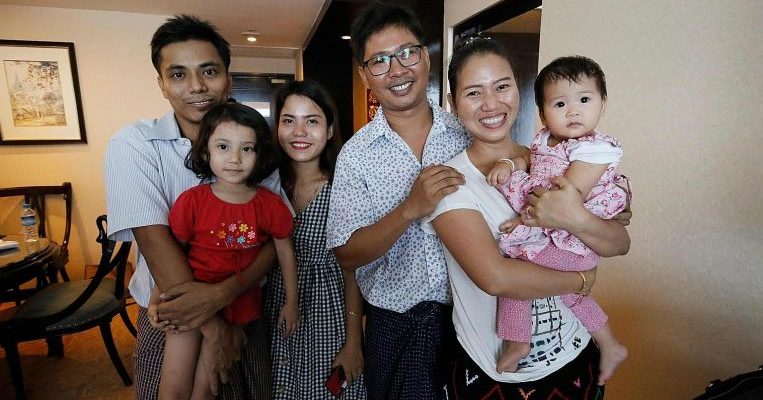
BANGKOK • The biggest obstacle to releasing two imprisoned Reuters reporters in Myanmar was not the country’s military, diplomats and others say, but its de facto civilian leader, .
Her seemingly incongruous opposition to freeing the two reporters, , was well known among the diplomatic emissaries who had repeatedly urged her to release them.
At times, she became angry when foreigners raised the case of the two men, who were imprisoned in connection with their coverage of the country’s crackdown on the Rohingya minority.
In an interview on Japanese television, she declared that they broke the law even before a court had delivered a verdict.
After their conviction, she insisted that their legal appeals must be completed before she would intervene, despite clear evidence that the police entrapped them.
She defied a relentless if quiet campaign by the Reuters news service, the US government and other Western nations to free the pair.
But the international pressure appeared to have an effect recently, at least among Ms Suu Kyi’s top aides.
Late last month, after Myanmar’s Supreme Court upheld the reporters’ conviction, her spokesman, Mr Zaw Htay, quietly advised an intermediary that their families should stop filing legal appeals, clearing the way for a presidential pardon, according to three people in the chain of communications.
After the families received his back-channel message, they dropped plans for further appeals and quickly drafted a new pardon request, said Ms Pan Ei Mon, Mr Wa Lone’s wife.
The release of the journalists is a rare concession by the Myanmar authorities in the face of intense global pressure.
The two journalists were arrested in December 2017 after they had uncovered a mass grave in Rakhine state, where the military is accused by the United Nations of committing genocide against Rohingya Muslims, killing and raping thousands and forcing more than 700,000 to flee the country.
The two reporters, who were awarded the Pulitzer Prize while they were behind bars, left prison last Tuesday after more than 16 months, ending a case that had brought global condemnation of Ms Suu Kyi and disrepute to her country.
The civilian leader has been conspicuously silent about their release.
As the reporters remained in prison, they became a symbol of the government’s attempts to suppress free speech and to minimise or deny the atrocities in Rakhine.
Ms Suu Kyi and her party, the National League for Democracy, share power with the military in a contentious arrangement enshrined in the military-drafted constitution of 2008.
The daughter of the country’s founding general, Ms Suu Kyi was awarded the Nobel Peace Prize in 1991 while under house arrest and became a symbol of resistance to tyranny. Many of her supporters expected her to expand protections for human rights and free expression after her party swept parliamentary elections in 2015.
Instead, crackdowns on free speech have persisted during her tenure, and hundreds of people are now in prison or face charges for speaking out.
Among those who pushed Ms Suu Kyi to free the Reuters reporters was Mr Bill Richardson, an American statesman and former UN ambassador. When he raised the issue with her early last year, she “exploded”, he said.
“Her face was quivering, and if she had been a little closer to me, she might have hit me. She was so furious,” he recounted. Mr Richardson, who had long considered Ms Suu Kyi a friend, resigned from a Myanmar advisory board on the Rohingya crisis because, he said, it was being used as “a cheerleading squad for the government”.
Another source of pressure on Ms Suu Kyi came from the Trump administration, with Vice-President Mike Pence taking the lead in seeking the Reuters reporters’ freedom.
Mr Thar Lon Zaung Htet, founder of the Protection Committee for Myanmar Journalists and a secretary of the Myanmar Press Council, helped the families communicate over the months with top officials, including Ms Suu Kyi, and with the country’s most powerful figure, Senior General Min Aung Hlaing.
“When I met Commander-in-Chief Min Aung Hlaing, I asked him to help in the Reuters reporters’ case,” Mr Thar Lon Zaung Htet said.
“He replied to me that he would help if he could. When I asked Daw Aung San Suu Kyi, she did not answer.” NYTIMES
